Top 25 Most Prestigious Culinary Schools in the U.S Today
 Top 10 Most Famous and Talented Chefs in the World Top 10 Most Famous and Talented Chefs in the World |
 Top 20 Best Recipe Sites And Apps For Cooking Beginners Top 20 Best Recipe Sites And Apps For Cooking Beginners |
| Table of Contents |
Programs and Degrees for Culinary in the US
Jobs for chefs and kitchen staff are predicted to grow by 25% between now and 2030, much faster than the average industry, according to the U.S. Bureau of Labor Statistics.
Students who attend culinary schools develop their knife skills as well as fundamental kitchen practices. Skills like sauce preparation, baking and pastry techniques, and menu planning are covered in practical cooking classes. Culinary programs typically offer classes on topics like food safety, cost and inventory management, and kitchen management in addition to cooking classes.
Graduates can find employment as private chefs, sous chefs, head chefs, and pastry chefs. They can work in the management of the culinary or hospitality industries.
Knowing the best culinary school to attend will help you meet your needs and advance your career goals, according to KnowInsiders. We started by compiling a list of institutions, community colleges, and universities that offer degrees or certificates in the culinary arts in order to decide which were the best.
The following institutions have demonstrated their excellence time and time again by graduating significant numbers of students who went on to open restaurants and work in some of the best kitchens in the world. These are, in our opinion, the best culinary schools in the nation.
What Is Culinary School?
Cooking and baking are two professions that many people go to school for. Students hone their knife skills and learn how to use various cooking implements. Meat preparation, baking, and plating and presentation are just some of the many skills taught in culinary arts programs. Internships are commonly incorporated into culinary arts courses to provide students with practical experience in the kitchen.
Courses in food safety, budgeting, and stockpile management are typically required components of culinary education programs. Management and business education are available through some programs. Graduates of these programs are well-equipped to take charge in the culinary industry.
Students can tailor their education at many different levels of culinary schools by choosing from a wide variety of electives and specializations, including hospitality management. Graduating from an accredited culinary program positions students favorably for competitive employment and professional certification in the food service industry.
Top 25 Best Colleges for Culinary in the United States Today
(Ranked, recommended by KnowInsiders)
1. The Culinary Institute of America
Location: Campuses in Hyde Park, NY, San Antonio, TX, Napa, CA and Singapore
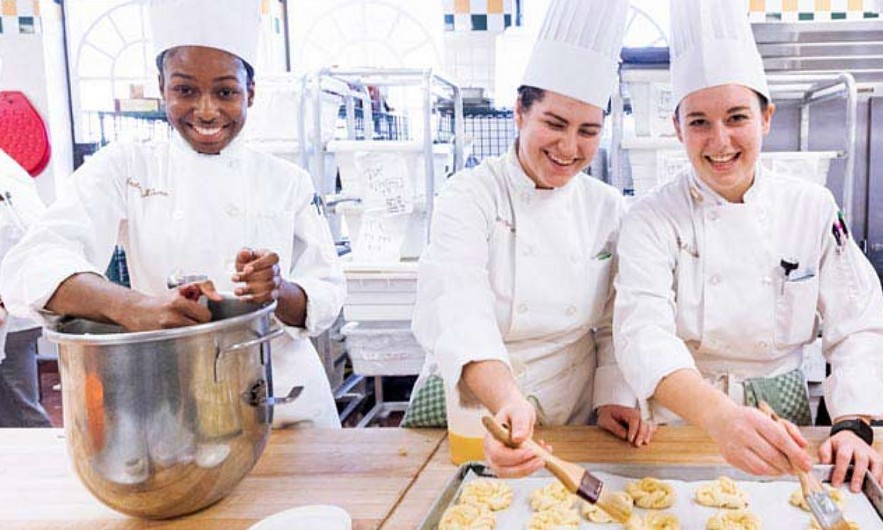 |
| The Culinary Institute of America |
Average Tuition
• In-state: $31,080
• Out-of-state: $31,080
• 4 years
On our list of the top culinary schools in the country, Hyde Park's Culinary Institute of America came in first. One of the best culinary schools in the nation and one of the most picturesque college campuses is the Culinary Institute of America, located in New York. There are four restaurants on the 170-acre campus that are open to the public and staffed by students.
Due to its commitment to giving students a top-notch educational experience, The Culinary Institute of America stands out. Both on-campus and online study options are available at the for-profit university, which has its main campus in Hyde Park, New York.
The abundance of learning opportunities, both online and offline, can be advantageous to students looking for a supportive learning community. The programs provide a range of personalization options, like electives and concentrations, to aid degree-seekers in achieving both their personal and professional goals. The Culinary Institute of America supports learners by offering a variety of resources, such as career workshops, mock interviews, and job fairs. According to the school's statistics, the undergraduate programs at the institution have a reported graduation rate of 70%.
Prospective students work with financial aid advisors to investigate available scholarship and grant opportunities as part of the application process. According to the most recent statistics, 81% of students use financial aid in some capacity.
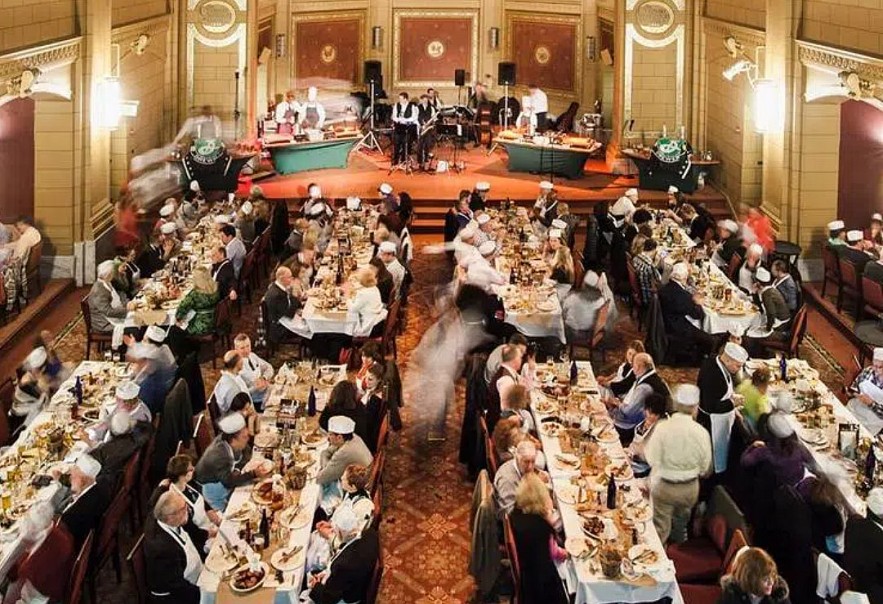 |
| Culinary Institute of America |
Online
Cost of tuition: $10,330/first semester; $8,790/second semester; $8,790/third semester; $8,790/fourth semester; $6,160/capstone semester
New York
Cost of tuition: $16,400
Other costs: Application, uniform, graduation etc.
California
Cost of tuition: $16,400
Other costs: Application, uniform, graduation etc.
Texas
Cost of tuition: $16,400 – $17,343/first semester; $16,400 – $18,340/second semester
Other costs: Application, uniform, graduation etc.
Website: www.ciachef.edu
2. Johnson & Wales University
Locations: Providence, R.I., Miami, Fla., Denver, Col., Charlotte, N.C.
Average Tuition
In-state: $33,054
Out-of-state: $33,054
By offering a variety of study options, Johnson & Wales University-Providence meets the needs of its students. On-campus and online enrollment are both available at the private institution's Providence, Rhode Island, campus. Additionally, online enrollment is possible.
The format that best fits a student's busy schedule and preferred learning style can be chosen by degree seekers. Participants work closely with academic advisors to choose courses that not only meet graduation requirements but also line up with their desired career path. Learners use a variety of resources to get ready for the workforce, including resume reviews, career workshops, and job fairs. According to reports, 65% of undergraduate students graduate.
To learn more about the available internal and external funding opportunities, interested parties should get in touch with the financial aid office. The entire student body is qualified for financial aid in one way or another.
Students at Johnson & Wales University can choose between a Bachelor of Science in Baking & Pastry Arts and a Bachelor of Science in Culinary Arts.
Among colleges and universities that provide culinary arts programs, Johnson and Wales University has long been regarded as a pioneer. After completing their programs, students will be well-equipped to begin lucrative careers in the culinary arts. The university's most recent data shows that 73 percent of students receive an employment offer after completing their internship, and that 96.8 percent of students find jobs overall within six months of graduating.
You’ll also benefit from an integrated arts and sciences curriculum to provide you with the analytical, critical thinking, and communications skills necessary for long-term career advancement.
Fees:
Providence
Course duration: 2 years
Cost of tuition: $35,750/semester; $71,500/year
Other costs: Plus fees
Charlotte
Course duration: 2 years
Cost of tuition: $35,750/semester; $71,500/year
Other costs: Plus fees
Website: www.jwu.ede
3. Auguste Escoffier School of Culinary Arts
Location: Location: Campuses in Boulder, CO and Austin, TX
The largest culinary school brand in the country is The Auguste Escoffier School of Culinary Arts. It has even been cited as one of the best culinary schools in the world by Chef's Pencil. The Auguste Escoffier School of Culinary Arts has a program to fit any goals a student chef may have.
Many of the culinary and pastry professionals who have graduated from this school over the years have gone on to find both personal fulfillment and professional success in businesses and institutions across the nation. Most students chose Auguste Escoffier School of Culinary Arts over larger, less individualized institutions because of their small class sizes, among other benefits.
Imagine yourself in a classroom setting where a renowned chef educator is right there to provide you with the individualized instruction you require to master culinary or pastry techniques. Your day is spent primarily engaging in experiential learning.
With the same cohort from beginning to end, you develop the critical teamwork skills you need in the workplace. The most effective way to learn the art of cooking is through our mentoring program.
Tuition
Online
Duration: 60 weeks
Cost of tuition: $19,495
Austin Campus
Duration: 30 weeks
Cost of tuition: $19,473
$450 Equipment and supplies
Boulder Campus
Duration: 30 weeks
Cost of tuition: $16,016
$450 Equipment and supplies
Website: www.escoffier.edu
4. Institute of Culinary Education
Location: New York, NY and Los Angeles, CA
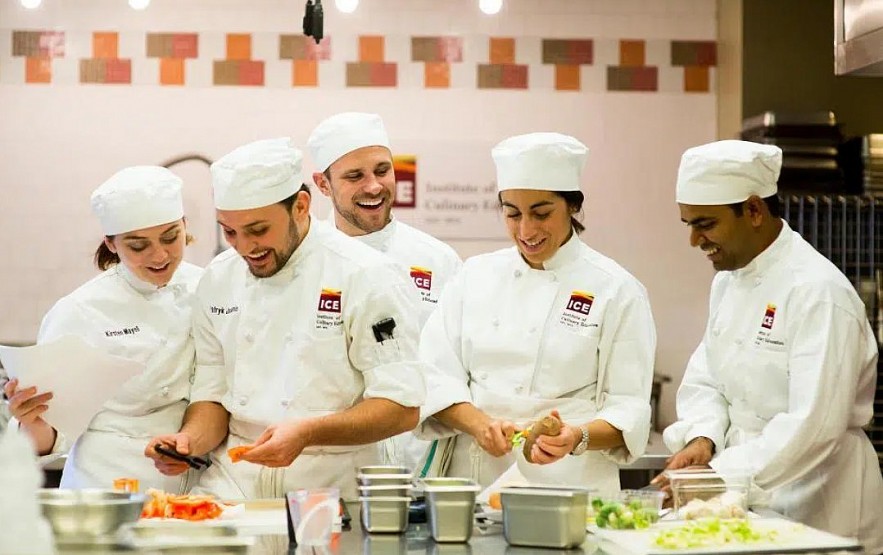 |
| Institute of Culinary Education |
According to USA Today, ICE is the top culinary school in the country. Offering diploma programs in culinary arts, baking, and pastry, it is an excellent institution. Each program lasts for about 600 hours, and it is instructed by experts in the hospitality industry.
Choose between two large campuses, one in downtown Manhattan, New York, and the other in Los Angeles, California. In addition to offering classes in cake decorating and bread baking, ICE hosts more than 500 special events annually. You can engage with and fully engross yourself in the culinary world in a variety of ways.
Tuition:
New York Campus
Course duration: 650 hours (8-12 months)
Cost of tuition: $36,120-$40,730
Other costs: Plus fees
Los Angeles Campus
Course duration: 642 hours (8-12 months)
Cost of tuition: $36,040
Other costs: Plus fees
| The Institute of Culinary Education (ICE) has been educating chefs for nearly five decades. No stranger to “best of” lists, ICE offers a variety of degree programs in:culinary arts, pastry and baking arts, culinary arts management, restaurant management, hospitality and hotel management. |
5. Walnut Hill College
Location: Philadelphia, Pennsylvania
Tuition - Net Price: $31,516 / year
National: $15,523
A for-profit, family-run culinary school is Walnut Hill College. They have spent close to five years developing committed business leaders.
Every degree program is designed with an experiential curriculum at its core. From the beginning of the program, students have the chance to work in the college's restaurants that are open to the public.
The cost of the tuition includes a trip intended to highlight "the best features of the industry abroad." Each degree includes a trip to England, France, Florida, or the Bahamas as its capstone so that students can experience firsthand the hospitality and culture that have been emphasized in their studies.
One of Philadelphia's first colleges to place a strong emphasis on excellence in hospitality education was Walnut Hill College, which was established in 1974 as The Restaurant School. By combining classroom instruction with practical training in our acclaimed restaurants, which are open to the public, we prepare our students for life in the real world. Of course, the training we provide takes place off campus as well.
One of the largest student populations in America, University City in Philadelphia, is where their students live and attend school. Our students have extraordinary access to excellent internships and jobs because there are restaurants and hotels in a busy environment just outside our door. Our students embark on tuition-free travel excursions far beyond Philadelphia as well!
Our programs' high point is a trip to Florida, the Bahamas, Florida, France, or England. Students from Walnut Hill College can broaden their knowledge and succeed wherever their careers take them by studying the industry both locally and internationally.
Website: www.walnuthillcollege.edu
6. Kendall College of Culinary Arts and Hospitality Management at National Louis University
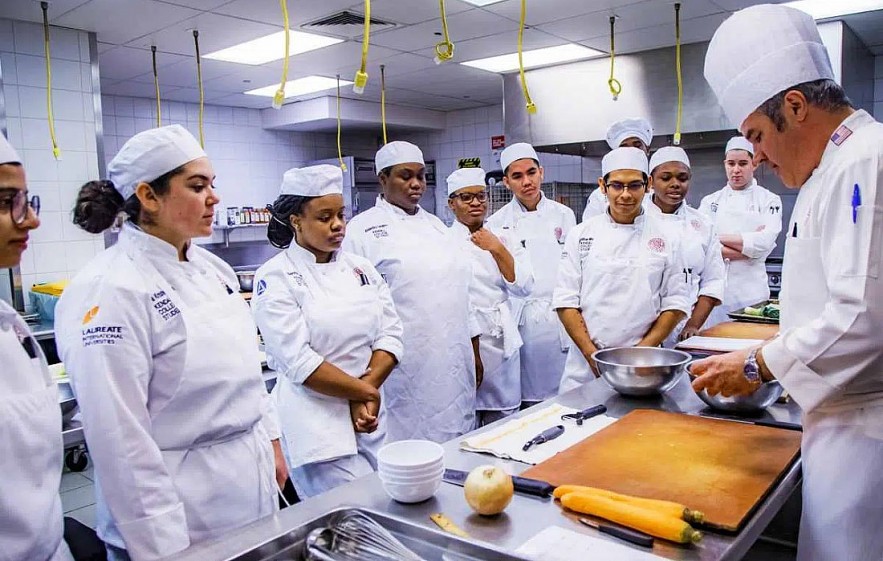 |
| Kendall College School of Culinary Arts |
Location: Chicago, Illinois
An associate's degree program in culinary arts is offered by Kendall College at National Louis University. A bachelor's program in culinary management is also available. Additionally, an accelerated associate's degree and a certificate in culinary arts are available. Each program has a thorough curriculum with classes taught in professional kitchens by chefs and bakers.
By finishing the Wine Professional Program, students can also strengthen their resumes. A teacher-directed approach is used in this special program to provide "contemporary-driven, rigorous, and accelerated programming of wine and beverage education." There are three different levels of courses that all lead to certification.
Tuition:
Culinary Arts Certificate
Course duration: 1 year
Cost of tuition: $19,309
Other costs: Plus fees
A.A.S. in Culinary Arts
Course duration: 2 years
Website: www.kendall.edu
7. Sullivan University (Louisville and Lexington)
Location: Louisville, KY
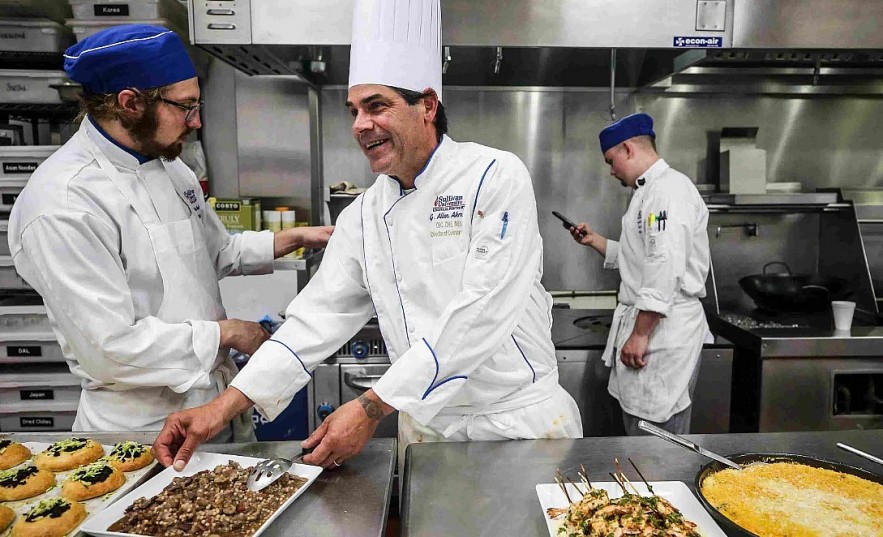 |
| Sullivan University National Center for Hospitality Studies |
One of the best culinary arts colleges in the nation is located at Sullivan University. An Associate of Science in Culinary Arts, a thorough degree that equips graduates to work in the best restaurants or even start their own company, is offered by their College of Hospitality Studies.
Industry experts instruct courses in state-of-the-art kitchen labs. Students participate in practicums and externships with the best restaurants in the area throughout their degree program. Since Sullivan offers year-round classes, students can earn an associate's degree in as little as 18 months.
There is a Sullivan culinary arts competition team for the competitive student. More than 400 gold, silver, and bronze medals have been won by the team to date at regional, national, and even international competition levels.
You can call yourself a "Professional Baker" or "Professional Cook" if you have a degree from Sullivan University. You will be receiving instruction in a lovely commercial kitchen from instructors with more than 500 years of combined experience.
For those who want to specialize in specialized areas of the industry, Sullivan University offers some interesting culinary degrees. This is the culinary school to pick if you're interested in a career in event management or tourism.
Tuition:
Lexington
Course duration: 21 months/94 Credit Hours
Cost of tuition: $495.00/Credit Hour/semester; $46,530 total
Other costs: Plus fees
Louisville
Course duration: 21 months/94 Credit Hours;
Cost of tuition: $495.00/Credit Hour/semester; $46,530 total
Other costs: Plus fees
Website: www.sullivan.edu
8. Culinary Institute LeNotre
Location: Houston, Texas
2 of 142 (ranked by niche) Best Colleges for Culinary Arts in the United States
The nation's top cooking schools consistently include Culinary Institute LeNotre on their lists. The Institute provides electives in the culinary arts, baking and pastry arts, and hospitality/restaurant management, as well as seven different degree programs.
Modern kitchens and labs, including brand-new baking, pastry, and cuisine labs, are used to teach students.
At the Culinary Institute LeNotre, students pursuing degrees constantly gain knowledge from accomplished business people. The option of practical seminars is available to students in addition to the required coursework. These seminars, which range in length from one session to ten weeks, cover a wide range of subjects and are a great way to expand one's skill set.
Alain and Marie Lenotre, third-generation French chefs, founded the Culinary Institute LENOTRE in 1998. French cuisine and pastry arts are synonymous with the LENOTRE® brand name. Students will learn to prepare hundreds of dishes at the CULINARY INSTITUTE LENOTRE®, where they will also study both traditional and modern cooking techniques and broaden their knowledge of a range of culinary-related subjects. This includes nutrition, menu planning, and wine basics for those enrolled in associate degree programs.
CATERPILLAR INSTITUTE With the option of specialty electives like hotel, hospitality, and restaurant management, LENOTRE® sommelier, or advanced artistic skills of pastry décor, LENOTRE® offers five programs: four elite diploma programs and three associate degree programs.
Tuition:
Culinary Arts Associate Degree
Course duration: 100 weeks
Cost of tuition: est. $11,988
Other costs: Books, supplies
Culinary Arts Diploma
Course duration: 50-60 weeks
Cost of tuition: est. $11,988
Other costs: Books, supplies
Website: culinaryinstitute.edu
9. Louisiana Culinary Institute
Tuition: Net Price ($23,139 / year) - National ($15,523)
Location: Baton Rouge, Louisiana
Highly regarded for-profit college Louisiana Culinary Institute is situated in Louisiana. With 114 undergraduate students enrolled, it is a small institution. The Louisiana Culinary Institute's acceptance rate is 23%, so admissions are selective. Popular majors include hospitality and tourism management, culinary arts, and food service and management. Alumni of the Louisiana Culinary Institute graduate 69% of their class and go on to make an average starting salary of $33,200.
The best culinary school in the South is Louisiana Culinary Institute. With their Associate of Occupational Studies degrees, Louisiana Culinary Institute provides a number of excellent culinary education opportunities.
Five hours per day of classes are taught on the Baton Rouge campus from Monday through Thursday.
Unusually, Louisiana Culinary Institute additionally provides ProStart, a two-year high school program. This program gives younger students the chance to obtain transfer credits and scholarships while focusing on both culinary arts and hospitality management.
Webstie: culinaryinstitute.edu
10. The Culinary Institute of New York of Monroe College
Location: Bronx, NY
Monroe College, a private, for-profit institution, is the official home of the Culinary Institute of New York. The Institute offers Associates of Applied Science degrees in hospitality management, baking and pastry arts, and culinary arts.
A Bachelor of Business Administration in Hospitality Management is also available. Degree programs incorporate both theory and practical instruction. The Dining Lab, the well-regarded student-run restaurant, offers student chefs the chance to put their education to use.
A special educational opportunity for senior high school students, America's Best High School Chef Competition is held annually at The Culinary Institute of New York. Students are welcome to compete with the culinary competition team once they have been accepted to The Culinary Institute of New York. The group has over a thousand ACF medals to its name and has even been crowned regional champions.
In close proximity to New York City's 23,000 restaurants is Monroe College. The best food in the world is available for you to sample after learning about it!
Both practical experience and theoretical food education are available at Monroe College. Choose between degree programs in culinary arts, baking and pastry arts, or hospitality management. Once you graduate, each one will be helpful to you.
Tuition:
Course duration: 2 years/4 semesters
Cost of tuition: $7,488/semester; $29,952/year
Other costs: Plus fees
Website: www.monroecollege.edu
11. Stratford University School of Culinary Arts
Location: Campuses in Alexandria, Baltimore and Woodbridge, VA
You can pick the Virginia campus of Stratford University that best suits you because there are several of them. The campus is very diverse because both the faculty and the students come from different nations.
Stratford wants to continue to be a leader in culinary education. The institution takes pride in imparting cutting-edge culinary innovation and new trends. Choose between a 15-month professional diploma program or an associate degree program in culinary arts.
Website: www.stratford.edu
12. Stratford University
Location: Falls Church, Virginia and Baltimore, Maryland
The Washington, D.C. metro area's Alexandria, Virginia is home to the for-profit university Stratford. With 480 undergraduate students enrolled, it is a small institution. The acceptance rate for Stratford is 100%. Popular majors include nursing, baking and pastry arts, and culinary arts and food service. Alumni from Stratford University earn an entry-level salary of $33,900, with 73% of students graduating.
The School of Culinary Arts at Stratford University offers Associate of Applied Science degrees in Baking and Pastry Arts or Advanced Culinary Arts. A professional diploma in advanced culinary arts is also available from the School of Culinary Arts. Each degree is carefully crafted to offer "a framework for the lifelong learning required for career advancement," and the courses are instructed by qualified professionals from the industry.
Both associate degrees may be earned online or on one of Stratford's campuses. Each of the five courses, which each last between five and ten weeks, is chosen by the student based on their interests in food. The majority of students can complete their associate's degree in as little as 15 months.
Website: www.stratford.edu
13. Metropolitan Community College
Location: Omaha, Nebraska
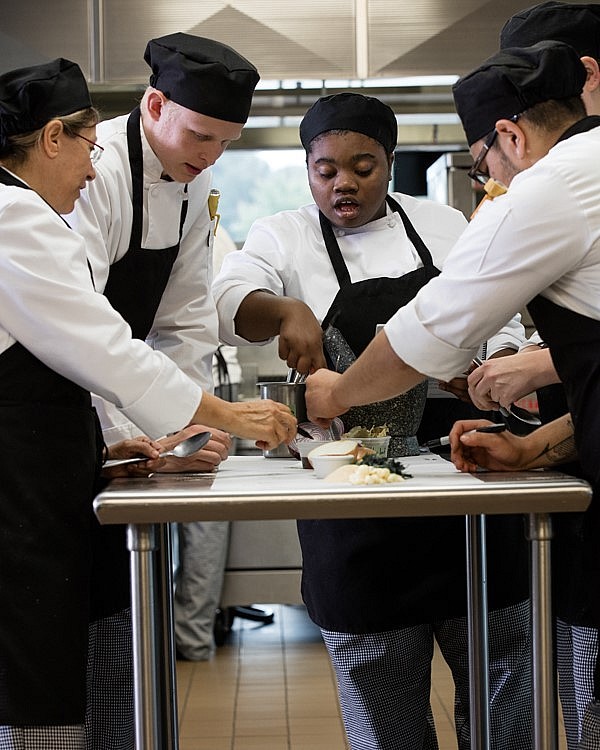 |
| Metropolitan Community College |
A top-tier culinary school and hospitality program are located at Metropolitan Community College. There are two tracks available in the program, one leading to an Associate of Applied Science in Culinary Arts and Management (Culinary Arts or Baking and Pastry) and the other to an A.A.S. in Hospitality and Restaurant Leadership (Food and Event Management or Hospitality Entrepreneurship).
No matter which track they choose, Metropolitan's student chefs are prepared for a successful career in the foodservice sector with the leadership and teamwork skills necessary. Those who want to expand their skill set can even obtain a career certificate from the Culinary Arts Foundation or a Certificate of Achievement in either baking and pastries or culinary arts and management.
Both culinary arts and baking and pastry arts associate degree programs are available at Metropolitan Community College. The fields of food and event management and hospitality entrepreneurship both offer two degree options. This course is for you if you've ever wanted to run your own restaurant!
MCC will provide you with the groundwork necessary to work as a chef or baker in the industry. You will receive instruction in state-of-the-art kitchens from outstanding chef instructors. While working and learning in small, practical class settings, develop strong leadership and teamwork skills.
Tuition
Culinary Arts and Management (CAMCE)
Course duration: 1 year
Cost of tuition: $3,267 (Nebraska residents)/ $4,900.5 (non-Neb. and international)
Other costs: Plus fees
Culinary Arts and Management – Culinary Arts Curriculum Plan
Course duration: 2 years
Cost of tuition: $6,699 (Nebraska residents)/ $10,048.5 (non-Neb. and international)
Other costs: Plus fees
Website: www.mccneb.edu
14. The Culinary Institute of America at Greystone
Location: St. Helena, California
The Culinary Institute of America is one of California's top culinary institutions. The Culinary Institute of America at Greystone is the prestigious institution's California outpost and is located in the heart of the Napa Valley. For those interested in a career in the culinary arts, the Institute offers several degree programs. They provide an associate's degree in culinary arts and baking and pastry arts. ACAP, or the Accelerated Culinary Arts Certificate Program, is also available. There are numerous fields where online master's degrees are offered, including:
Food Business
Sustainable Food Systems
Wine and Beverage Management
For former students of CIA, CIA California also offers a Bachelor's degree in Food Business Leadership.
The stunning former residence of the Christian Brothers Winery now serves as the Culinary Institute of America at Greystone. Greystone, a 19th-century building that is listed on the National Register of Historic Places, provides guests and students with:
award-winning restaurants
illy bakery cafe
culinary marketplace
Learn more about the culinary program at The Culinary Institute of America at Greystone
15. Henry Ford College
Location: Dearborn, Michigan
The Henry Ford College culinary arts program has been carefully created to transform novice chefs into accomplished cooks. Students receive a Certificate of Achievement in Culinary Skills before they start the program. After that, they proceed to earn an associate's degree in Culinary Arts or Hotel/Restaurant Manager before completing their education with a bachelor's in Culinary Arts. They can finish these degree programs without having to worry about changing schools and losing important credits or picking up a new program.
Any phase of the program is open to students. There are also two opportunities for food industry internships and useful business coursework. In addition to being accredited by the American Culinary Federation, Henry Ford College's culinary program has earned the ACFEFAC's "exemplary" seal.
The culinary programs at Henry Ford College are based on the extensive hands-on lab time and internships required to graduate from European cooking schools. After graduation, graduates of this program will be capable of managing a real kitchen because they are well-rounded chefs.
Tuition:
Culinary Arts Associate in Applied Science
Course duration: 71 credit hours
Cost of tuition: $13,099 (in-state)/ $18,993 (out-of-state)
Other costs: Plus fees
Culinary Arts Bachelor of Science
Course duration: 120 credit hours
Cost of tuition: $22,140 (in-state)/ $32,100 (out-of-state)
Other costs: Plus fees
Website: www.hfcc.edu
| Obtain a two-semester degree in hotel services, baking and pastry, or culinary skills. This diploma program can also be used as a stepping stone to an accredited associate's degree program. You will graduate from Henry Ford with the training and credentials necessary to stand out in the culinary industry. |
16. Great Lakes Culinary Institute at Northwestern Michigan College
Location: Traverse City, MI
Northwestern Michigan College is the official home of the Great Lakes Culinary Institute. The Institute offers A.A.S. degrees in Culinary Arts and Culinary Sales & Marketing in addition to certificates in Baking Level I and Culinary Arts Level III. Each program's curriculum at the culinary arts school places a strong emphasis on correct technique and the science involved in choosing, preparing, and serving food to both large and small groups.
You will be prepared for any chef or kitchen management position with the help of the culinary arts curriculum at Great Lakes Culinary Institute. The motto of the school is "learning by doing". Students will have the opportunity to work in a real, 90-seat restaurant that welcomes customers from across the nation.
Earn a level one or level three certificate in baking or culinary arts. Additionally, you can pursue an associate's degree in applied sciences with a culinary arts concentration.
Five culinary labs, including an advanced cooking kitchen, a garde manger kitchen, and a 90-seat teaching restaurant, are available to students at The Great Lakes Culinary Institute.
Tuition:
Culinary Arts Certificate Level 1
Course duration: 1 year
Cost of tuition: Coming fall 2022
Culinary Arts Certificate of Achievement
Course duration: 2 years
Cost of tuition: $14,700 (in-state)/$19,600 (out-of-state)
Other costs: Plus fees
Culinary Arts Associate in Applied Science Degree
Course duration: 2 years
Cost of tuition: $19,800 (in-state)/ $26,400 (out-of-state)
Other costs: Plus fees
Website: www.nmc.edu
17. Institute of Technology
Location: Clovis, California
A Culinary Arts Diploma or a Baking and Pastry Specialist Program are the two culinary programs available to students at the Institute of Technology. The American Culinary Federation Education Foundation Accrediting Commission (ACFEFAC) has designated both programs as "exemplary," a designation given to only two other culinary schools in California.
Students have the option of pursuing their chosen program in one of three ways: part-time, full-time, or accelerated.
Chefs work in the kitchen and receive instruction from seasoned professionals right away. The Institute of Technology is aware that in the world of food, experience counts for a lot. A 180-hour externship at the end of each culinary program helps students get ready for a successful career in the industry.
Website: www.iot.edu
18. Culinary Arts Institute at Oakland Community College
Location: Farmington Hills, Michigan
One of the best culinary programs in the country is available at Oakland Community College. In addition to two Associate of Applied Science degrees in culinary arts and management development/hospitality, Oakland Community College's Culinary Arts Institute also offers a certificate in baking and pastry arts. Each degree program prepares future chefs for a long and prosperous career through practical coursework, opportunities for event planning, and even culinary competitions.
Students at culinary arts schools have the opportunity to put their skills and knowledge to use in two public eateries and a campus bakery. The award-winning Ice Carving Team is based at the Culinary Arts Institute.
19. Drexel University
Location: Philadelphia, Pennsylvania
One of the top universities with culinary programs is Drexel University. One of the few culinary degrees they offer is a B.S. in Culinary Arts and Science. Drexel's degree program balances culinary arts, food science, business, and hospitality management rather than emphasizing either culinary arts or culinary science. It is therefore the perfect program for a student with lofty goals. Future chefs are exposed to working professionals at organizations like Food & Wine magazine, America's Test Kitchen, and Hershey Foods as part of the four-year degree's six-month co-op.
Students at Drexel University pursuing a B.S. in Culinary Arts and Science have the option of adding a minor in either entrepreneurship, business administration, or marketing to their undergraduate degree, or they can spend an additional year earning an MBA.
For Drexel students interested in studying abroad in Rome, Italy, there is also a program available.
20. Culinary Studies Institute at Oakland Community College
Location: Farmington Hills, MI
You can obtain an associate's degree in applied science with a focus in culinary arts by enrolling in Oakland Community College's Culinary Studies Institute. Students who complete this program will have the groundwork necessary to work as an executive chef or food and beverage manager.
The first year of the program focuses on the technical skills required to work in a kitchen as well as the history of food. The second year develops culinary expertise by incorporating both traditional and modern cuisines. It is a complete and well-rounded program.
Tuition:
Culinary Arts (CUL.AAS)
Course duration: 2 years
Cost of tuition: $6,732 (in-district)/ $13,056 (out-of district)
Other costs: Plus fees
Webstie: catalog.oaklandcc.edu
22. Keiser University Center for Culinary Arts
Location: Melbourne, Sarasota, and Tallahassee, Florida
The Center for Culinary Arts is located at Keiser University and has been designated as a Quality Culinary Education Program by the World Association of Chef Societies. The college grants associate degrees in culinary arts.
In the course of their 72 credits, student chefs at culinary schools gain practical experience by working in labs and kitchens. They complete an externship and receive instruction from actual business experts.
22. San Francisco Cooking School
Location: San Francisco, California
San Francisco Cooking School has classes for everyone, whether you're looking for a certificate or are just interested in taking a fun cooking class. The culinary school offers two certificate programs in professional pastry & baking arts and professional culinary arts for those looking for the former. Both culminate in "Bakery Day," when students run an entire restaurant from start to finish. Each student also receives an externship.
At the San Francisco Cooking School, all of the instruction is practical, and visiting chefs from the Bay Area's culinary scene are frequently invited to teach and network.
23. Southern Maine Community College
Location: South Portland, ME
Did you know that the food industry predicts that America will require 60,000 new chefs annually? SMCC is prepared to provide highly qualified professional chefs to help meet this demand! If you obtain an associate's degree in culinary arts at SMCC, you will undoubtedly be prepared to enter the workforce right away.
The course covers every facet of simple food preparation. You'll discover information about bread, sauces, soups, vegetables, fish, meats, and much more. Additionally, business management and kitchen management are stressed. This is perfect for anyone who wants to understand both the operations of a kitchen and the business side of the food industry.
Tuition:
Course duration: 2 years
Cost of tuition: $6298
Website: www.smccme.edu
24. Ivy Tech Community College Bloomington
Location: Bloomington, IN
Ivy Tech takes pride in charging only one-fourth as much as competing culinary schools nearby. Despite the reduced cost, the school has earned recognition as an excellent program and is accredited by the American Culinary Federation. Select from two-year degrees or certificate programs in culinary arts, baking and pastry arts, or hospitality management.
The American Culinary Federation's standards are taught to the students during their training. Graduates can go on to work as a sous chef, culinary specialist, or even a restaurant owner. With an Ivy Tech degree, you can pursue the culinary career of your dreams.
Tuition:
Technical Certificate – Culinary Arts
Course duration: 2-3 semesters
Cost of tuition/semester: $2,243.25 for in-state students; $4388.55 for out of state students
Cost of tuition/year: $4486.5-$6729.75 for in-state students; $8777.1-$13165.65 for out of state students
Associate of Applied Science – Culinary Arts
Course duration: 4 semesters
Cost of tuition/semester: $2,243.25 for in-state students; $4388.55 for out of state students
Cost of tuition/year: $8973 for in-state students; $17554.2 for out of state students
Webstie: www.ivytech.edu
25. Anne Arundel Community College-Hotel, Culinary Arts, and Tourism Institute
Location: Arnold, MD
There are numerous types of culinary programs available at the Anne Arundel Community College. Numerous different science majors can use continuing education courses, personal enrichment courses, and culinary credit courses. We can see why this is one of the best culinary schools because there are so many options!
The culinary program at AACC is run by a group of experienced chefs. They allow you to pursue your passion for cooking while teaching you the ins and outs of the kitchen. Start with a straightforward class for personal development before continuing on to a full degree! After taking one or two classes, you will undoubtedly become obsessed with learning about the culinary arts.
In America, there are so many outstanding culinary schools. Each one will aid in your development as a chef and instruct you on how to succeed in the hospitality industry. A degree from a culinary school will greatly enhance your résumé. If you have a degree from one of these institutions, you can be certain that you will land the culinary job of your dreams at the best restaurant in town. Which prestigious culinary school should you select?
Website: www.aacc.edu
FAQs About Culinary
What is the length of training to become a chef?
The degree level you choose to pursue will determine how long it will take you to become a chef. For instance, associate's and bachelor's degrees typically require two and four years to complete, respectively, while certificate programs in culinary schools can be completed in as little as a few months. Considering that the majority of employers prefer to hire chefs who possess at least an associate's degree. It is best to budget for 2-4 years of professional culinary training from a recognized culinary school if you intend to pursue a career in the culinary arts.
How Does One Become an Accredited Chef?
Chefs-to-be can obtain certification after attending culinary arts school. The Bureau of Labor Statistics reports that certification can result in salary increases and career advancement. There are 16 professional certifications offered by the American Culinary Federation (ACF), including sous chef, pastry chef, and culinary professional. Private chef certifications are also available from ACF.
Candidates for certification must fulfill requirements for education and work experience.
Candidates for certification must fulfill requirements for education and work experience. For ACF certifications, completion of an accredited program and passing marks on the written and performance exams are typically necessary. Lower-level certification, courses in restaurant management, and passing exam results are requirements for the certified master chef credential.
Every one to five years, certified chefs must maintain their certification by completing continuing education requirements. ACF provides opportunities for continuing education, such as conferences and online classes.
Do culinary degrees have any value?
The U.S. Bureau of Labor Statistics predicts a 25% increase in culinary arts jobs between now and 2030. This moves much more quickly than the typical occupation. Based on anticipated income growth and economic growth following the Covid-19 recession, that projection was made. Given the outlook for restaurants, it would seem to be a great time to graduate from culinary school.
What distinguishes a culinary certificate from a degree in the field?
Programs for certificates or diplomas at culinary schools can be finished in 8–12 months. They come in baking, pastry arts, and culinary arts.
Although they typically only cover the fundamentals, they are also available in other closely related fields.
However, degrees from culinary schools can be earned in as little as two years (for an associate's degree) or as long as four years (for a bachelor's degree). A lot more in-depth coursework is offered at culinary schools, which also frequently offer other useful business classes like marketing and hospitality management. The majority of people who are just starting out in their careers opt for a culinary degree, though culinary certificates are most useful as a supplementary education.
What is the price of culinary school?
Depending on whether an associate degree or a bachelor's degree is desired, the average cost of a culinary school degree ranges from $35,000 to $54,000. A student chef can cut this cost by enrolling in a community or smaller university. They can also benefit from the numerous financial aid programs that the majority of culinary schools provide.
There might be additional costs to consider for culinary students. They might need to buy a toolkit for cooks with all the ingredients they'll need. Chef's knife, wire whisk, tongs, and a meat thermometer may be among these items.
A uniform might also be required for students.
What is the application procedure for a culinary degree at a college?
The admissions process for students interested in a culinary degree will probably be the same as for other college majors. They will have to fill out an application for admission and, if necessary, pay an application fee. A high school diploma or an equivalent will need to be shown as proof to the culinary institute.
Depending on how competitive the program is, you might be asked to an interview. The submission of an essay is another possibility. You must describe your motivation for pursuing a culinary degree and include any relevant experience. Even though many applicants to culinary programs have prior culinary experience, it's usually acceptable if you don't. You'll learn everything you need to know from the program to succeed!
Do Online Culinary Schools Exist?
Online courses may be preferred by students with both professional and personal commitments due to their flexibility. Online courses are offered by some culinary schools, especially in disciplines like food service management, food safety, and cost management. However, because it is a practical industry, culinary arts programs need some in-person training.
What Is the Price of Culinary School?
The price of culinary school varies by institution and course of study. In general, community colleges' culinary programs are less expensive than those at four-year universities. In-state students can also receive tuition breaks from some programs. Scholarships and grants are two examples of financial aid programs that students can use to help cover their annual tuition costs.
When evaluating the cost of a degree, tuition isn't the only important consideration. Prospective students should carefully investigate the reputation of potential schools because it can have a big impact on their chances of finding work after graduation. A program with a good reputation may have a higher tuition price, but it will provide greater long-term value in terms of job prospects than a program with a bad reputation.
How Does Admission to a Culinary School Work?
Although the requirements for admission to culinary school vary by program, most applicants hold a high school diploma or its equivalent. Additionally, many culinary schools have an entry-level age requirement, frequently 17 years old. Although some programs might have additional requirements, most don't require applicants to show they can cook before being accepted.
When Does Culinary School Start?
The duration of a culinary program varies depending on the type of program and the enrollment status of the student. A bachelor's degree in culinary arts typically requires four years of full-time study, whereas an associate's degree requires two years. The completion time for a culinary certificate or diploma, which is also an option for students, is typically less than a year.
Students can also enroll in full-time courses, which follow an apprenticeship model rather than a conventional university model more closely. Similar to a full-time job, full-time programs typically consist of 6–8 hours of class per day, five days a week. Due to the intensive nature of this schedule, many students are able to complete their studies within 6 to 8 months.
ACF Accreditation: What Is It?
Accreditation from the ACF is available to culinary schools that uphold high standards. The American Culinary Federation (ACF) accreditation, which is given by the American Culinary Federation Education Foundation Accrediting Commission (ACFEFAC), recognizes schools based on faculty credentials, curricula, and student services. To keep their accreditation, schools must go through regular reviews.
For students, accreditation increases their access to financial aid, and some employers will only consider applicants with accredited degrees. The majority of certifications also demand completion of an accredited program. The Council for Higher Education Accreditation has recognized ACFEFAC as a programmatic accrediting organization.
Food Service Jobs and Salary
Graduates of cooking schools can work as chefs, head cooks, or even managers in the food service industry. Several common paths for those with a degree in culinary arts are discussed below.
Chefs and Head Cooks
Restaurant chefs and head cooks are in charge of the food preparation. They oversee and train the kitchen staff, guarantee the quality of the food, and check the workspace to ensure cleanliness. They create recipes and place food orders for the restaurant. Many chefs and head cooks enroll in culinary arts programs to hone their culinary skills and acquire knowledge of menu planning, inventory management, and food safety.
Median Annual Salary; 48,460
Projected Growth Rate: 11%
Food Service Managers
Restaurants and other establishments that serve food and beverages have managers who are in charge of the day-to-day operations. They oversee the kitchen staff, manage the company, and encourage customer satisfaction. They also place orders for food and beverages, hire staff, and manage the cooking process. Food service managers also oversee payroll records and ensure that staff members adhere to health and food safety regulations. Graduates from programs in hospitality or food service are prepared for positions as managers in the industry.
Median Annual Salary: $54,240
Projected Growth Rate: 11%
Bakers
Bakers mix ingredients and adhere to recipes to create breads, pastries, and other baked goods. Before baking dough in an oven or grill, they must ensure the quality of the ingredients, set up the baking equipment, and mix the dough. For retailers, eateries, wholesalers, and institutional food services, they might bake goods. Bakers frequently receive their training on the job, but going to culinary school can help them advance their careers and get more training.
Median Annual Salary: $26,520
Projected Growth Rate: 6%
Cooks
In restaurants and other eating places, food is prepared by cooks. They prepare ingredients, cook meals, and inspect food for freshness. Food may be arranged and served by the cook. Cooks must also organize their supplies and clean their workspace. Many cooks enroll in culinary schools to receive instruction in cutting-edge cooking methods.
Median Annual Salary: $25,200
Projected Growth Rate: 11%
Bartenders
In bars and restaurants, bartenders mix drinks and serve them to patrons. They frequently extend a warm welcome to guests, inform them of the day's specials, and take drink orders. Wine, beer, and mixed drinks may all be served by bartenders. They might also manage the bar's operations, take payments, and verify patrons' IDs. To advance their knowledge, some bartenders enroll in culinary or bartending schools.
Median Annual Salary: $22,550
Projected Growth Rate: 8%
 Ways to Make Cooking Oil As Car Fuel: Step By Step Ways to Make Cooking Oil As Car Fuel: Step By Step It is possible to run a vehicle on cooking oil. If you plan to make the switch, consider these ways to make cooking oil and ... |
 How To Preserve Eggs With Rice and Cooking Oil for 6 Months Without Refrigeration How To Preserve Eggs With Rice and Cooking Oil for 6 Months Without Refrigeration Preserve eggs easily with one of these safe and effective ways to make them last months and even years longer! |
 Top 20+ Best Free Cooking Sites And Apps For Food Lovers Top 20+ Best Free Cooking Sites And Apps For Food Lovers Cooking is much easier if you have the assistance from recipes on cooking sites and apps. Check out Top 20+ Free Cooking Sites And Apps. |
 Top 10 Best and Most Popular Biscuit Brands in the World Top 10 Best and Most Popular Biscuit Brands in the World There are many famous brands of biscuits with many different types and flavors. Below is a list of 10 most famous brands of delicious biscuits ... |























